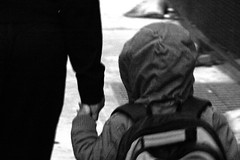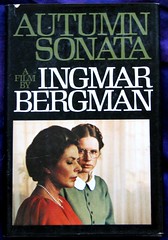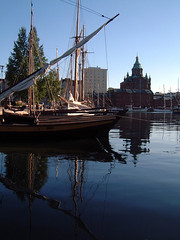Friday, June 05, 2009
It Doesn´t Take A School
I was playing with these gigantic soft building blocks with my 3-year-old nephew when this approximately 5-year-old kid turned up - with his Mom. He started ripping toys from my nephew, got intentionally on his way in the slide and spent most of his time just beating stuff up.
I gave him nasty looks so he understood to move away but he kept testing the limits. The mother was standing next to this kid, checking her mobile and flicking through the photos on the digital camera. The kid kept running around, jumping recklessly on the pillows and destroying the constructions built by others. The mother witnessed the situation but did not act upon it. The kid had a similar look in his eyes as the jerk sergeants during my military service. He knew he was feared - and was loving it.
I can´t see into this mother´s head. But I can´t accept her actions. Maybe she was just glad of her child not being the "weak" one being bullied. But without intervening she was teaching her son that this kind of action is OK with strangers. She was teaching her son that this is how you get things through.
The situation made me sick and I lured my nephew out of the room with the power of ice cream. The mother was upholding the "boys are boys"/"real men" attitude, which prevents boys from going to hobbies such as dancing, makes them scared of showing weakness or sadness and locks them up in tightly framed expectations where violence is the only allowed method of proving your masculinity.
Tuesday, June 02, 2009
Connecting The Dots
I was struck by the Finland she was telling me about. She told about a school that did not accept her due to her religion. She left a country traumatised by war and where she was told several times that she did not belong. She left the country and her family for a better life, with no knowledge of English and no relations waiting in the other end.
The reasons for migration have not really changed in 50 years. But it seems to surprise some people here in the receiving nations that millions decide to leave all they have for a chance of a better life. People risk everything they love for some undefined dreams. For a promise with no money-back guarantee. It seems to surprise people even when the story can be found from each family.
It is surprising and - honestly - disappointing how we here, in a country that has transformed from a departure country to a receiving country, have continuing difficulties to comprehend that the people wanting to move to Finland share largely the reasons of those relatives of ours who left for Sweden, Germany, UK or the US. Paradoxically the other group - the ones who left - are portrayed as heroes when the the others - the ones arriving - are characterised as social bums. It is not only my great aunt who has difficulties connecting dots. Making this historical link might help understanding the transformation we are in as nations.
Something else has also stood the test of time: desire. Most people are not striving for something bizarre and condescending like tolerance and understanding. They are seeking for voting rights, good future for their children, a home, a job and some friends. Not tolerance but bread and freedom.
Oops, I think I just defined the American Dream.
Monday, March 02, 2009
Tuesday, February 03, 2009
Project North
And hey, the movie is distributed free of charge. Download it here.
Tuesday, January 20, 2009
This Was A Good Day
Yes, watched the inauguration, was moved by Aretha Franklin but that´s that. I want to write about something more personal, smaller. Three years of age and approximately one-metre-high to be exact.
In last month´s Monocle the editorial staff had done a list of 50 promises for 2009 which would help you make your life better and for you to feel happier. The things on the list were actually quite excellent such as overhauling your magazine subscriptions, finding a sunny spot, changing your way to work and starting a recipe book. One of my favourites was starting to plan your dream house. I look at my neighbouhood in a fresh way now. The list is on our fridge door and already two things have been crossed as "done".
I chose 37 from the 50 things on the list but this is one to add: hang out with your little relatives regularly. Today - for the first time - I picked my nephew from day care and we took public transport to his home. It was just awesome.
This little guy in winter clothing looking like a Michelin Man was happy and energetic from playing football outside. He commented on people passing by and was quite excited by the tram and metro. My favourite moment was the three-year-old boy on the bright orange big metro seat chewing on the liquorice bar we picked from the kiosk together. He looked so happy and relaxed swinging his legs in the air.
All through the trip for me the little hand holding mine nearly brought tears to my eyes. Kids are way cool. And so is responsibility. The fact that my sister and brother-in-law trusted me enough to let look after their precious little guy home felt amazing. My godson squeezed my hand so tightly through his ridiculously thick mittens. This afternoon hour goes up there to my list of top experiences.
This day made me think of this comment a friend of mine made once: how would our society be different if the primary goal of the society would be a good childhood? What kind of obligations and duties it would give to us adults? And what kind of possibilities would it open for more adults to help parents make that dream happen? Was it Hillary Clinton ripping an African proverb: it takes a village.
Friday, January 09, 2009
Not On Automatic
I am looking at things slightly differently. Starting my own business and working for myself does not automatically mean that I would start working less, more likely is the opposite. As regular working hours are gone, it is easy to extend the working day from both ends. But at least now, after a humble experience of three days, being in control of my own schedule feels quite empowering.
I meet a lot of people who tend to act like their life would be on automatic gear and constantly accelerating. Ending a regular job and taking the entrepeneurial risks on my shoulders means for me that I go back to the traditional gear shift. I drive my own vehicle and I am therefore responsible for its road safety and maintenance. I started this yesterday with a visit to the insurance company.
Even when I will be most likely working more and longer days, on times like these it feels good to be closer to the ones you love and being able to plan personal matters into the middle of my day and not only after 17h00. Having a one-day-old nephew and having 3-year-old nephew with the need of daycare every now and then, it feels good that I can put my work-vehicle on gear 1 (or even lower) at times and take time for going to the park.
Thursday, December 18, 2008
Right Move
In two days the van will head back to Finland. The boxes and bags are packed and tomorrow is my farewell party from work. Today I carried two bags of stuff home from the office. This evening when packing the last boxes, I was once again quite surprised by amount and sort of stuff I have collected in the last four years - seriously, 20 sorts of tea...
This video link from the one I am heading to is once again a proof that this is the right move now. Not that I would have doubted it for a second. Even the tough Nordic winter is bearable when you are surrounded by the ones you love and who love you right back. Christmas is a good time to return.
Monday, December 08, 2008
Moving Boxes, Moving On
I am glad that the move takes this form. Schiphol airport for me is a place that means short trips abroad. I know how it functions and it does not link to anything permanent. The car ride and the ferry make it concrete: time to move on, time for a change and most sadly, time to leave.
It is not yet clear what my days will be filled with from January onwards. I have sent papers for a company to the authorities and made some contacts but that is where we are. I have decided to allow myself to take some time to figure out what is the next step, what I want to do and what gives me the kicks. It is also essential to reserve time for the primary reason for packing these boxes: building a joint home and being closer to me family and friends.
With the risk of sounding to obamaesque, change feels good. Four years in one organisation is a long time. Having now the possibility to work for myself and focus on content generates a lot of excitement. After I made this decision to jump and start something new, I have not regretted it for a moment. I feel it is made for the right reason: not for the sake of leaving something but for the sake of wanting something.
Wednesday, October 08, 2008
The Troubles
An innocent question in a discussion between Finnish secondary school students and President Halonen earlier this year on the Finnish civil war led to an unsurprising reaction from the President. She hesitated for a moment, clearly felt uncomfortable to answer and finally said:"red rebellion". Halonen´s reaction to events long before she was born showed how deep the civil war is still especially in the generation of my parents. How it is still, in 2008, more or less leading the list of things people don´t want to talk about.
The small article in Helsingin Sanomat earlier this year describing this moment popped into my mind tonight when listening to Kjell Westö talking about his book Missä kuljimme kerran - one of the most widely read Finnish novels of the last 10 years. The book describing the generation born around 1900 has now been translated into Dutch and Westö was visiting the Finnish Embassy for that occasion. He shared with an audience a comment he heard, which describes to a large extent still the attitude of Finns to the tragic events of 1918 where according to some estimates 37.000 people lost their lives:"We have not discussed that for 100 years and we are definitely not going to start now."
Westö´s book is an important book for me. It helped me understand what my grandparents have gone through, what was the world my parents were born into and why the Finnish identity is the way it is. It also helped me start a discussion with my older relatives on the time before I was born. Westö said tonight beautifully that with his books he attempts to help the audience to remember that there were people on these streets before. He also reminded the audience that even when language played a big issue in the civil war, there were Swedish-speaking and Finnish-speaking people on both sides. The histories of people are more complicated than we often allow ourselves to realise.
I always thought that the tragic incidents of 1918 as well as 1939-1945 are issues that I can talk about with an open and critical mind. I mean I had no part in them. This was until 2004 when in a New York subway an American lady in her 60s asked me and my friends in the middle of a casual conversation:"I just wanted to check. During The War, which side were you on? On our side or the other side?" That uncomfortable feeling of shame, that sudden sweat and the blushing caught us all by surprise. We stuttered and it took us a lot of time to deliver an answer. Maybe Westö was right today when he said that it takes 6 generations before a war turns into another historical event.
Sunday, August 17, 2008
World's Toughest Springboard
I cannot help being blown away by America. Every visit makes me love it more and simultaneously leaves me more and more confused. I am realising ever clearer thatwe should not pretend like our lifestyles would be similar. Where Europe is safe and cosy, America is radical in its ups and downs - on the individual, local and national level. No European economy goes up and down like theirs and no European nation state contains the same diversity as the US. The New York Times featured earlier this week a research that by 2043 minorities will form the majority of the US population.
But simultaneously no European state is as divided as the United States. Visit to Chicago and California makes everyone race conscious, whether you want it or not. As novelist James Frey puts it in today's Financial Times:"I think Los Angeles is a city that embodies contemporary US society. It's segmented and divided, rich and poor. It's the American dream in its purest form, whether you're there searching for a roof over for your head or for international stardom." It's no place for cowards, America is still in many ways a cowboy's playground.
It is not a coincidence that in affluent areas of big American cities African Americans and Hispanics could be seen largely only behind the coffeeshop counter or cleaning the hotel rooms. United States is a diverse society which does not mean yet that it would be a mixed or equal society. Recent study showed that only 1/70 of children are born into black-white families. Mixed families or circles of friends tend to be still the rare incident proving the rule right.
But beyond all these things, like James, Frey, I have been seduced by the American Dream. People still believe in the power of the individual to make it. They believe in their possibilities to provide happiness and affluence to themself and their family. In that Californian living room I heard no comments about giving up. Everyone I talked with over the last three weeks said the same: it will spring back up, it just takes some time. It's this relentless optimism that leaves me energised. It is what James Frey captures in his fantastic book Bright Shiny Morning: no one claims America is living up to its promise for all but the dream keeps the springboard swinging, and millions of people reaching out for that happiness.
Saturday, May 10, 2008
Basis
I don't think I stand alone outside of the crowd with my anxiety - you could even say fear - especially towards buying a house. I realise on a rational level that it would have been wise for me to buy an apartment when in Helsinki - let alone in Amsterdam. I mean I have been in this city for 3,5 years which does not count anymore as a short visit. But on the level of action I hesitate. I feel that a morgage creates this massive burden in your life and from then on everything somehow revolves around it. It's like a cage you have locked yourself into. I know this thinking does not make sense and I can push it aside but not wipe off.
Today I visited the new home of a friend of mine on the new islands north of Amsterdam's centre. An apartment of a real adult - and the view- really impressed me. He has the same sort of job as I do and we are of same age. That and the oh so Dutch discussion over housing prices with my colleagues yesterday really made me think whether it is time to grow up and take these kinds of responsibilities seriously. I was reminded by my colleague that an apartment can also be seen from the point of view of investment and it does not have to be the main expression of who you are.
People say that things like your own home, children or a healthy and loving relationship create this peace in your life. I am understanding the sermon due to having the last one of those for the last year. Explorations to the adult world like today make me really ponder whether our generation - people like me - are just scared of making commitments, scared of choosing one over another and therefore oh so restless and anxious. I mean is it an issue of just getting a grip of things?
Sunday, April 27, 2008
And We Would All Be Safe
Of course the sense of instability and anxiety is not a privilege of teenagers. Kate Kellaway writes in this weekend’s The Observer how insomnia is becoming an epidemic of our era. The numbers are shocking: 27 % of Brits have at least three nights of bad sleep per week, 63 % suffer at least one. One in four Brits are finding it difficult to sleep well. The Western world seems to be turning into a community of unhappy, scared and wealthy zombies.
The Observer had asked a number of insomniacs to tell about their difficulties with sleep. As an insomniac myself, the stories are frighteningly familiar. During the last three and a half years I can’t remember a week when I had slept well seven nights in a row so reading the article felt like they had installed Big Brother cameras into my bedroom. As any insomniac knows, lack of sleep is not 100 % bad. Journalist Tim Adams describes the unusual moment of clarity emerging often in the middle of the night when sitting in a quiet house with your laptop and schoolgirl Elsa Vulliamy talks about the fear of the bed. It is black AND white, good AND horrible. “I’d just want it to be morning again” – a quote from Vulliamy – is something right from my mind earlier this week but I also can remember from my freelancer days the addiction to working in the middle of the night - which had as its flipside the grumpy zombie moments around three-four in the afternoon. And someone who always sleeps well cannot understand how much like a Superman an insomniac feels after nine hours of continuous sleep.
After my presentation yesterday we ended up talking about the responsibility of adults – teachers and parents specifically - when it comes to teenagers sharing intimate stuff online. We have entered a world where more and more parents are finding it difficult to perform some of the key roles of being a parent: protecting the child, passing knowledge onward and at times making the decision for the child. The helpless feeling is something we all insomniacs recognize – you feel very abandoned and helpless, lying in your own bed eyes wide open and thinking about the rest of the world resting in peace.
Friday, April 25, 2008
I Know Me
Today’s most stimulating speech was Swedish Actor/Director America Vera-Zavala who showed a clip from her play Etnoporn. The monologue takes the position of a young woman with an immigrant background who wants to win the Swedish Idol competition and simultaneously start a political and sexual revolution. The highly acclaimed and popular play attacks the way Sweden deals with immigrants, immigrant women and tolerance. In her clip the main character is seen shouting:
“We are normal! We don’t want to be multicultural! We are Swedish!”
“We’re tired of multiculturalism. I am tired of project managers!”
Vera-Zavala herself has Latin American parents, was born in Romania and moved to Sweden in the age of three. She accused the European culture for being fundamentally racist and criticized heavily the way the Swedish establishment has for instance embraced the Gringo phenomenon where a group of immigrants started claiming back the notion of an immigrant through a magazine and other forms of media. She stated that she feels that things are not improving when the establishment is introducing notions like second-generation or third-generation immigrant and branding a range of social problems as ethnic problems. According to Vera-Zavala the focus has only shifted from 1970s’ “violent and abusive Latin American men” to today’s “problem with the Muslims”. As she said:“I don’t want another generation of girls needing to feel like they have to defend their fathers against stereotypes on violent immigrant men.”
She said it is absurd when a teenager with an immigrant background is all through childhood told that she is Swedish but at the age of 13 she seems to always turn into an immigrant or when a woman beaten by her husband is forced to a discussion over “your culture” with the police.
Vera-Zavala’s take was personal but according to some of the Swedes she was inaccurate and incorrect and thing were improving. As a British theatre director Karina Johnson rightly stated, we have a major problem where one’s personal experience of discrimination or racism is not valued but brushed off as a coincidence or as an exception to the rule.
The situation reminds me of an experience of my dear friend who was interrupted in an important seminar by a Finnish middle-aged multicultural expert when my friend stated in her talk that she as an immigrant feels more comfortable in Amsterdam than in Helsinki. The Finnish “expert” felt that she had the right to publicly invalidate someone’s personal experience of discrimination. The level of arrogance shown in this is just criminal.
Vera-Zavala’s presentation made me wonder what is the Finnish future in this respect. Just a few month’s back the lifestyle magazine Image praised in their editorial and in a big feature the Gringo phenomenon saying that we would need something similar in Finland. I am wondering whether these kinds of phenomena help the native establishment to “talk with and about immigrants” but whether they actually lead to equality of opportunities. Because let´s face it: this kind of critical self-distancing ironic reflection is the way we are used to talking about identities.
Thursday, February 28, 2008
Class Dismissed
Last weekend I read with great pleasure my friend Laura Kolbe's book on social classes in Finland. The goal of Professor of European History Kolbe and Cultural Anthropologist Katriina Järvinen was to break the silence on socio-economic backgrounds in Finland and shed light on the fact that we all do not belong to the middle class and that social mobility works both ways. The book is based on interviews and addresses issues of shame, humiliation and joy in a fresh and rare manner. Kolbe and Järvinen encourage us all to talk openly about class.
They pick on a highly important issue. Finland is not a flat society where everyone has the same chances. Although the social mobility in general has been rapidly upwards over the last few decades, only between 2003-2007 more than 100.000 new people were classified as poor in Finland. Finland had last year 650.000 people earning less than 750 euros per month (from a population of 5 million). Accidentally, in the project that I run, the researchers of Demos were last week in Finland interviewing young people and it was heartwarming to hear from them that the Finnish teenagers are concerned about the growing difference between the haves and the have nots.
To join Kolbe's and Järvinen's movement, I could say that I have belonged to the middle class all my life, maybe even upper middle class. My parents are part of the generation that experienced the fast urbanisation of Finland and who still believe passionately on the empowering role of education. We were never swimming in money but we never lacked a single thing. The economic recession of Finland in the 90s did not influence me in the same way as it did my friends from Eastern or Northern Finland. I remember one of my best friends telling how she saw it all through her mother working as a social worker and her father running his own company.
I am part of the generation Kolbe describes as the generation from the suburbs with detachment to the nation state and not a strong sense of community to the physical surroundings. Me and my friends belong to subscenes in Finland which can also be found from other European countries. My relationship with the countryside could well be described as awkward.
But I am conscious of my background. My mother comes from a big family which experienced the high price Finland paid after the Second World War. My grandmother had to abandon her home within a few hours and they were settled to a new part of Finland. On my father's side our family brings together Swedish-speaking bourgeois and Finnish-speaking working class. My uncle was a worker's son who was exceptionally allowed to play on the tennis court of the better people. Even our last name is part of the story of a birth of a nation: Lindstedt was changed into Laitio as part of the patriotic dream of an independent Finland.
I am grateful for the opportunities Finland has given me but I don't think it is all of my own doing. In my work I see constantly that we do not start from an even playing field. Class still matters in the same way as gender or ethnicity. Only for raising your own class consciousness, I recommend reading the book.
Tuesday, February 19, 2008
Jumping up together
Yesterday evening I had a long chat on what counts in the end, i.e. what is the foundation for happiness. We talked about what real friendship means and how moving to a new country makes you push yourself often to an oversocial mode even to gain 20 % of the social circle you had back home. We talked also about work. Career surely is important but if we actually take some time to think things properly, it is easily outruled by family, love and friends. Relying purely on career is an empty but common road to follow.
As I was thinking of subjects for this post, I went through the historical independence of Kosovo and the irritatingly evangelical empty rhetorics of Barack Obama. But it is difficult to say anything new on either of those subjects. The EU's recognition of the independence declaration made me smile whereas Obama's "momentum" makes me afraid of a post-electoral hangover. I must say - even sounding too much like a friend of the system - that I like Clinton's notion of being in the solutions business. But also her star is not shining as brightly in my eyes as some weeks back - Ms Clinton, dirty tricks may work on the short term but they are lethal for the system in the long run. Offering something yourself is better than bashing the other.
But back to the things that constitute happiness. I mean of course post-Bush and peace in Europe works also for my benefit but you get the point. A colleague of mine played this song of the Dutch singer Alain Clark to me at work last week on a sunny day. Even if it irritated me in the beginning due to its simpleness in melody and text, it truly makes me smile and makes me appreciate once more the fact that I have an amazing family and a group of true friends - although often too far away. It also made me think of a discussion I had with my awesome brother during the Christmas break. The foundation of happiness is fairly simple: when you have a firm basis and a 100% guaranteed safety net, it is easier to jump higher.
Tuesday, September 11, 2007
Dysfunctional Pause Button
It’s quite clear where I come from. I realised it once again when visiting Helsinki over this weekend. The following may be something that only people who live or have lived outside their own country can in the end grasp. When visiting home, you realise that people’s lives do move on also while you are not there.
You see your young relatives who are not sure who you are. You saw them only a few months ago but you do not seem familiar anymore. They have learned new words and they run in a funny new way.
You see friends who are separated and you did not even know that they had problems. They thought that you knew.
You see dear friends, have one of those fantastic evenings, talk warmly about your relationship with them. You wait together on a chilly taxi stop at 1.30 a.m. jumping up and down to keep yourself warm. And then you realise that they can have this every single week.
It is not like life would be unsatisfactory where one lives. There’s friends, nice apartment, dear places and all that. It is not like life would be constant longing. There’s things that people here don’t have. Complaining is not the issue, it’s more a realisation.
It is just that the people who you have known for ages seem to somehow move on and you realise that Facebook is not a complete solution. It is not a question of blame as people move on in both ends. You are there and here and then again not.
Tough.
Monday, July 30, 2007
Family
The news about Ingmar Bergman passing away today brought Autumn Sonata back into my mind. All his films I have seen are rather challenging and intimate captions of how we in the North deal with each other. They also show some of the reasons for the way we escape reality through alcohol.
As I opened my email today, I saw emails from both my Mom and Dad. Once again - and linking to Bergman´s Autumn Sonata - I realised how fortunate I am to have a family like mine. Their emails really made me emotional. Even if I am celebrating my birthday far away from the people most dearest to me, they still are there. Today´s phone discussions with my parents and my siblings really made my day.
When one reaches thirty, there is often a pressure to do a personal evaluation talk. There is this great piece of lyrics in Baz Luhrmann´s song Everybody´s Free:"Work hard to bridge the gaps in geography and lifestyle because the older you get, the more you need the people you knew when you were young."
Monday, July 02, 2007
History comes with names attached
Normandy is really beautiful - no wonder Impressionists like Monet were taken by it. We rented a dovecoat (basically a 4-floor tower) from a beautiful small village called Offranville and spent the days by sipping cider, playing with the nephew (not at the same time), learning basic phrases in French (favourite being Mon Dieu) and so on. I can highly recommend a visit.
Before the visit my relatives were going on and on about the D-Day sites like Omaha Beach and the American Military Cemetery in the village of St Laurent. I must confess that I wasn't too eager for a prospect of a three-hour car ride to see battle fields but decided to go along.
I am so glad I went. Seeing the American cemetery with over 10.000 crosses and the German one with more than 20.000 men buried there is a powerful reminder of what happened only some years back. I especially liked the fact that both graveyards stress the great loss and do not build a narrative of heroism around such a tragedy. The feeling, however, is quite different in the German and the American one. When the American one is a collection of white marble cross on a beautiful seashore, the German one has more than two men buried in every grave and is situated next to a motorway.
I spent a marvellous week in Normandy with the people I love. The thousands of tombstones with names of men my age or even younger remind that the beautiful coastline was the end for all these people and a starting point for their families and loved ones. After visiting the cemeteries I did not feel like going to the battlefields. I had seen what I came to see - a strong manifestation for peace.
Friday, June 15, 2007
Family affairs and other stuff
It has been a relatively good week altogether. I started from London with a visionary discussion on higher education and continued for Tuesday and Wednesday in Helsinki for meetings and a oneminutesjr workshop and on Thursday flew back to Amsterdam.
Our team grew on Thursday as our intern started. She seems great and will definitely help us in daily work as well as in brainstorming.
I think I have written about this before but it does not hurt to say the obvious: I have a great family. I realised it once again when I saw them for two evenings in Helsinki. Apart from being dear to me, they are also humane and good people. Having worked with orphans and people who have lost their families in civil wars, sometimes it is good to remind yourself that these things should not be taken for granted. My homies are fab folks.
My nephew has started walking which is funny to observe. He seems to have a healthy (un-Finnish) self-esteem because he trusts his still slightly wobbly feet a bit too much. You hear a stomp every too minutes but when you turn to see if he hurt himself, he is already on his way to new dangers. Funny dude.



























